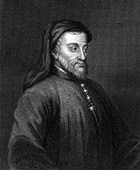Geoffrey Chaucer (born 1340/44, died 1400) was born in London. His name was of French origin and meant shoemaker. Chaucer was the son of a prosperous wine merchant and deputy to the kings's butler, and his wife Agnes. Little is known of his early education, but his works show that he could read French, Latin, and Italian.
In 1359-1360 Chaucer went to France with Edward III's army during the Hundred Years' War. He was captured in the Ardennes and returned to England after the treaty of Brétigny in 1360. It it said that during this period he translated from the French the allegory Romaunt of the Rose, which was his first literary work. Chaucer was so valued as a skilled professional soldier that his ransom, £16, then a tidy sum, was paid by his friends and King Edward. There is no certain information of his life from 1361 until c.1366, when he perhaps married Philippa Roet, the sister of John Gaunt's future wife, and one of Queen Philippa's ladies. Philippa apparently gave him two sons, 'little Lewis', to whom Chaucer addressed A Treatise on the Astrolabe (1391), and Thomas, who was later highly successful in public service. Philippa died in 1387 and Chaucer enjoyed Gaunt's patronage throughout his life. He was in the King's service, held a number of positions at court, and spent some time in Spain.
Between 1367 and 1378 Chaucer made several journeys abroad on diplomatic and commercial missions. It is possible that he met Giovanni Boccaccio or Petrarch in pre-Renaissance Italy in 1372-73. And it is said that the example of Dante gave him the idea of writing in the vulgar English rather than in the court French of the day. In 1374 he became a government official at the port of London, holding the post of Comptroller of the Customs and Subside of Wools, Skins, and Tanned Hides. During that time he was charged with rape, but his guilt or innocence has never been determined. In 1380 he paid Cecile Champaigne for withdrawing the suit. In 1385 he lost his employment and rent-free home, and moved to Kent where he was appointed as justice of the peace. He was also elected to Parliament. This was a period of great creativity for Chaucer, during which he produced most of his best poetry, among others Troilus and Cressida (c. 1385), based on a love story by Boccaccio.
When his wife died, according to records, Chaucer was sued for debt. Several of his friend were executed by the Merciless Parliament. In 1389 Richard II regained control and Chaucer reentered the service of the crown as Clerk of the King's Works, to upkeep and repair governmental buildings in and out of London. Later 1390s he received royal gifts and pensions. Chaucer seems to have been in attendance (1395-96) on Henry Bolingbroke, John of Gaunt's son, who deposed Richard II in 1399 and who, as Henry IV, increased Chaucer's annuity.
The last years of his life Chaucer lived at Greenwich, "an Inne of Shrews," as the Host calls it in the Canterbury Tales, referring perhaps to the occasion when he was held up or mugged there, not once but twice in the same day. According to tradition, Chaucer died in London on October 25, 1400. He did not leave a will and it has been speculated that he was murdered. The regime of Thomas Arundel, Archbishop of Canterbury, did not accept attacks on the clergy and the ideas of the Lollards, who wanted to return to the apostolic poverty. Chaucer himself had friends who supported the reformist movement. Chaucer was buried in Westminster Abbey, in the part of the church which afterwards came to be called Poet's Corner. Virtually all the surviving manuscripts of his work date from the fifteenth century. A monument was erected to him in 1555.
Chaucer took his narrative inspiration for his works from several sources, including the Romance of the Rose by Guillaume de Loris, Ovid's poems, and such Italian authors as Dante, Petrarch, and Boccaccio. Their works he may have read during his travels in Italy. Chaucer remained still entirely individual poet, gradually developing his personal style and techniques. He must have heard a number of tales in his life time, it was the most common entertainment in the period of Black Death, popular unrest, serfdom, peasant revolts, foreign and local wars.
His first narrative poem, The Book of the Duchess, was probably written shortly after the death of Blanche, Duchess of Lancaster, first wife of John Gaunt, in September 1369. It was based largely on French sources, particularly the Toman de la Rose and several works of Guillaume de Machaut. His next important work, The House of Fame, was written between 1374 and 1385, and draw on the works of Ovid, Vergil, and Dante. Soon afterward Chaucer translated the Consolation of Philosophy by Boethius, and wrote the poem Parliament of Birds.
Biography from: ReadPrint.com |






